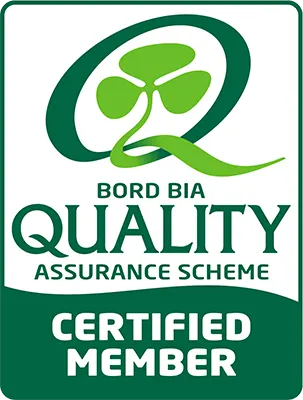Heat stress can have significant detrimental impacts on milk production, reproductive performance, and immune function.
In addition, research has shown that the negative effects on reproduction due to heat stress occurs before milk production declines.
Heat stress evident on Irish farms
Heat stress is evident on several farms, and while there is some wet weather on the horizon, temperatures are forecast to stay high for the next while. With higher relative humidity, this can further increase the risk of heat stress. In addition, cows and cattle under stress will experience an increase in cortisol, a stress hormone that in turn can impact intakes, performance, health, and fertility.
Heat Stress and feed management
Feed intakes can drop within the first 24 hours of experiencing heat stress, and milk depression (both volume and components) will rapidly follow.
High fibre feeds create heat while being fermented as part of the digestion process in the rumen, so often cows can be seen to reduce forage intake, or sort buffer feeds. Unfortunately, this reduced forage intake puts cows at risk of acidosis and can further depress butterfat in milk.
Proactive rather than reactive management is important to minimise the impact on your stock. For example, protecting and conditioning the rumen will combat acidosis and help maintain butterfat and milk yield.
Buffer feeding should be carried out overnight (7 pm-6 am) to reduce the impact of increased heat generated by the fermentation of fibre in the rumen. In addition, increasing the nutrient density of rations while keeping a good source of highly digestible fibre in the diet will combat the reduced forage intake.
Moist feeds are an excellent addition to your system for buffer feeding and to combat the nutritional stress of high dry matter forages. The addition of yeast and a proven rumen conditioner will maintain function and, in turn, cow health.
Protect rumen function
Vistacell™ acts as a probiotic to improve rumen and gut health by boosting beneficial rumen bacteria and improving rumen fermentation.
By removing oxygen and competing for sugars in the rumen, Vistacell improves the environment for fibre digesting and lactate utilising microbes, allowing them to thrive and grow. The result is an increase in microbial protein production, optimised rumen pH, and improved fibre digestion.
When combined with Acid Buf™, a highly efficient rumen buffer, the rumen is being conditioned to best cope with the period of stress.
The unique marine mineral matrix consumes excess acid in the rumen and regulates long term optimum pH in the rumen, which counteracts the reduced saliva and sodium bicarbonate production commonly seen in animals with heat stress. As a slow-release rumen conditioner, Acid Buf™ reduces the time below pH 5.5 to less than 1 hour and maintains a higher daily (24 hours) mean pH.
Talk to Specialist Nutrition today about proactive management strategies for any periods of stress on farm.
Call 051 833071 or WhatsApp Amy on +353 87 408 1002





